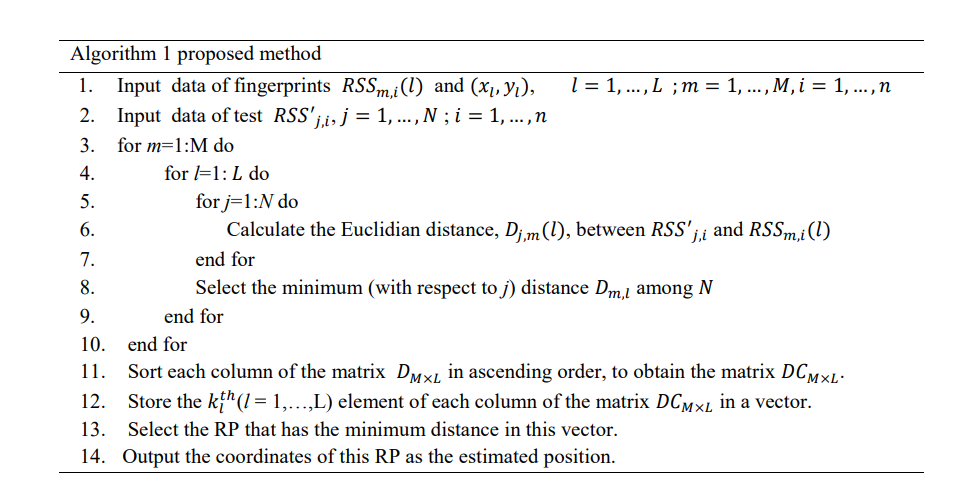Search the Community
Showing results for tags 'algorithm'.
-
I made a post a while back about this topic here: and I've clarified a few things with my friend. 1. The input from the project will be coming from a mobile app which will be using a qr code. The qr code contains the Room Number and the 2 Access Points for each room. When a user scans the qr code it will pass that info to the web app that has the algorithm and verify what room he/she is in the access point that was 'scanned'. 2. For the testing of the project we decided to use two rooms of the building of our alma mater and the access points were already defined based on tests: Room 413 has Access Point 1 that have the values of -67 dBm to -89 dBm and Access Point 2 that have the values of -40 dbm to -57 dBm while Room 415 has Access Point 1 that have the values of -30 dBm to -46 dBm and Access Point 2 that have the values of -75 dBm to -100 dBm 3. I already inputted the values and the rooms I've mentioned above in mysql to verify if the input from the qr code that was scanned it correct. but sadly we are stuck with the algorithm itself.
-
Hello, Have an associative array of variable length and variable key names. The POST array can have the following structure, where [rec_n] can have one or many elements. : $_POST Array ( [rec_1769057] => on [rec_1768743] => on [ponumb] => D000000034 [strnbr] => 100 ) The 'n' is a variable SKU number and concatenated from a select statement. There are thousands of SKUs. PONUMB and STRNBR are static and will always be at the end of the array. I have an algorithm for slicing this array into two separate arrays. skuitems Array ( [rec_1769057] => on [rec_1768743] => on ) postrnbr Array ( [ponumb] => D000000034 [strnbr] => 100 ) The two arrays are then assigned to a $params array one for each update statement... $params Array ( [0] => Array ( [0] => 1768743 [1] => D000000034 [2] => 100 ) [1] => Array ( [0] => 1769057 [1] => D000000034 [2] => 100 )) I would like to accomplish the above in one go... At present the solution has and O(2) notation. Here is the algorithm that works, but seems clunky to me. if( isset($postar) && is_array($postar)) { // first order of mag. $cnt = count($postar) - 2; // total minus last two elements $postrnbr = array_slice( $postar, -2, 2 ); // always ponumb and strnbr $skuitems = array_slice($postar, 0, $cnt); // will be one or more sku items $skukeys = array_keys($skuitems); $qparams = array(); //bind params for update statement foreach($skukeys as $sku) { // second order of mag. $skusplit = explode("_",$sku); // ie Array( [0]=>rec, [1]=>1234545 ) $qparams[] = array($skusplit[1], $postrnbr['ponumb'], $postrnbr['strnbr']); } } Thanks in advance! rwhite35
-
Hi guys, I'm trying to calculate where a future date runs in a 15 day cycle pattern, and then if the day lands on day 13 or 15 of the cycle pattern I want to do something with the result. For example: $pattern = 15; $start_date = strtotime("2015-12-14"); // day 1 // Day 15 = 2015-12-29 $chosen_date = strtotime("2016-03-30"); $difference = ($chosen_date - $start_date) / 83400; // Find which Day the 'chosen_date' comes in the sequence and... If($chosen_date == 13 || $chosen_date == 15) { Echo 'possible outcome. Day $chosen_date."; } Else { Echo 'not possible, day $chosen_date'; } Hope it makes sense! Cheers
-
I'm helping a friend in developing a project for our alma mater. And its based on this paper: An Enhanced Indoor Positioning Method Based on Wi-Fi RSS Fingerprinting So far 80% of the web app is finished except for the algorithm (We have no experience with algorithms to source code translations) that needs to be implemented in the website. Inside this paper there is this algorithm that the proponents of the research used. (attached as screenshot). The algorithm was converted to code by using MATLAB, but we are trying to use PHP with our project. Based on the pseudo code the calculation of the Euclidean Distance is the core of it. Can anyone help us with the translation just to get it started.

